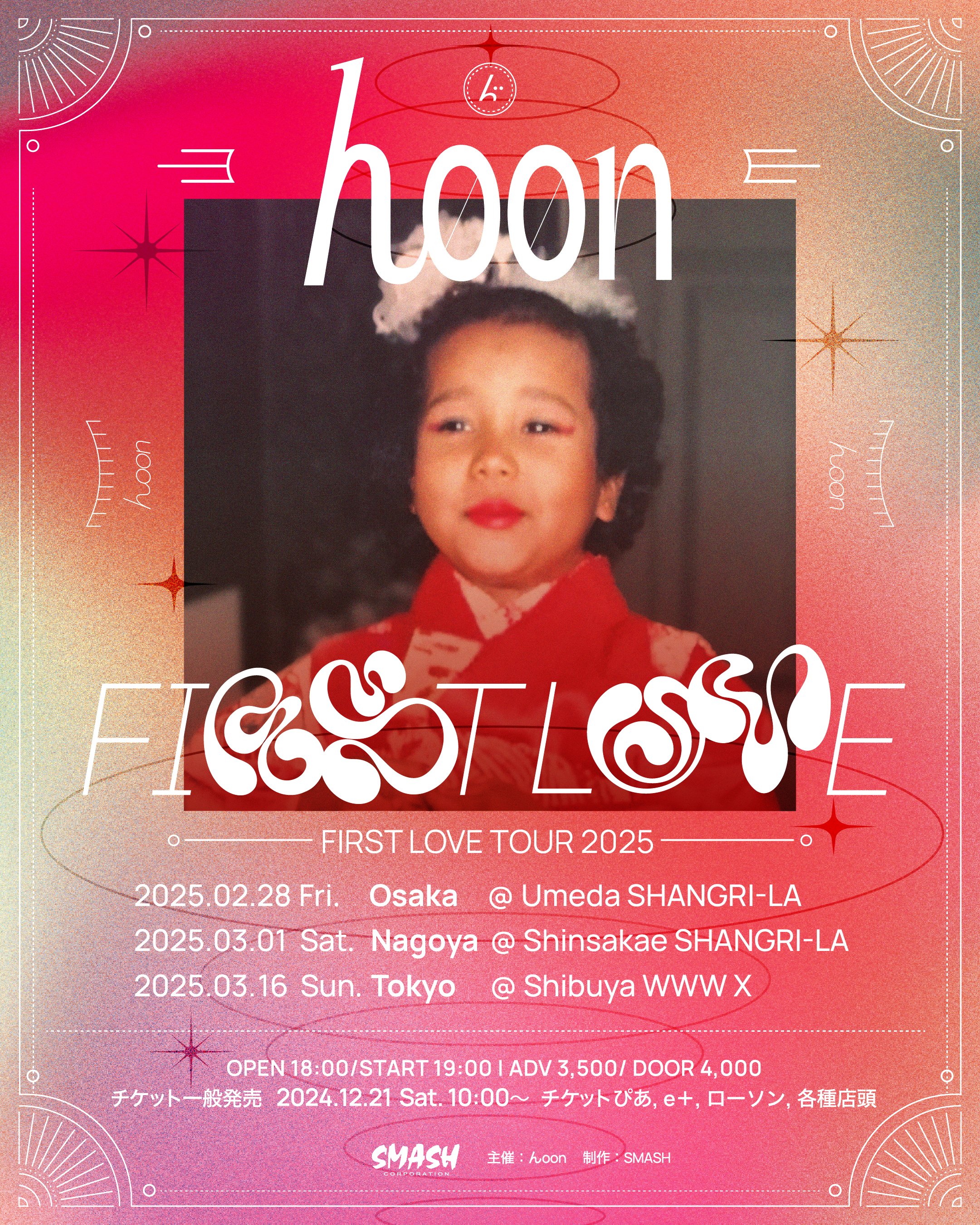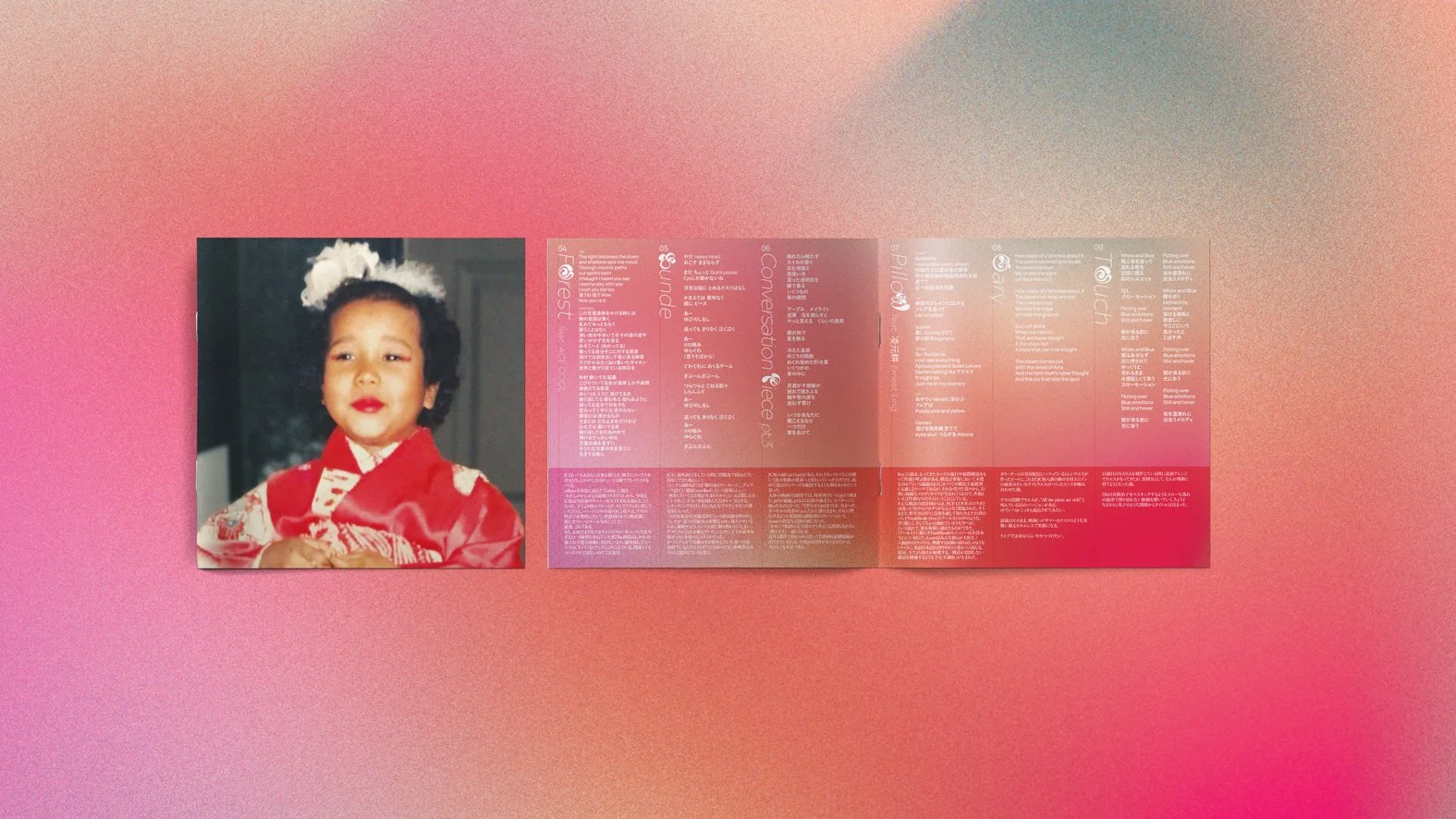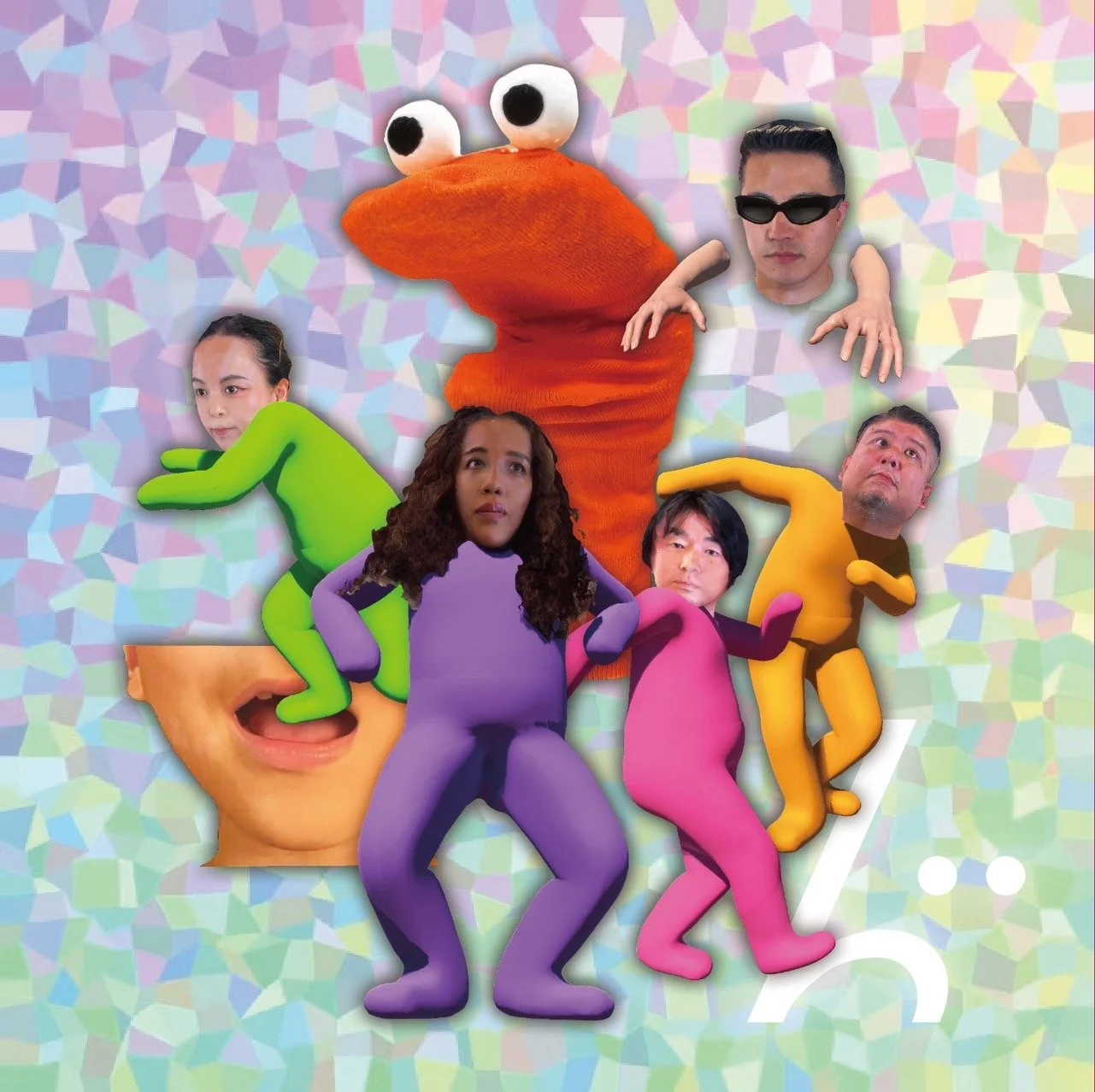んoon 1st FULL ALBUM "FIRST LOVE"
2024.11.20(WED)
NEW RELEASE!
Tracks
01. To Dog
02. Kaiya
03. Age
04. Forest feat. ACE COOL
05. Sunde
06. Conversation Piece pt.3
07. Pillow feat. 凌元耕 Ernest Ling
08. Gary
09. Touch
10. Sherry
11. NANA
12. Billion
んoon
Vo. JC
Ba. Naoto Sekijima
Key. Kensaku Egashira
Harp. Yuko Uesu
Support Dr. & Perc:
Yoshinari Kishida(TRACK 03, 04, 05, 06, 07, 08, 09, 10, 11, 12)
Nanaco Shiozu, Beat Satoshi from skillkills(TRACK 02)
Recording:
Track 01, 02 and all main vocal rec: Yui Kimijima (Tsubame Studio)
Track 03-12: Tomoro Shimada (hmc Studio)
Mixing:
Track 01: Yui Kimijima (Tsubame Studio)
Track 02-12: Tomoro Shimada (hmc Studio)
Mastering:
Pete Maher
CD RELEASE/ Distributor:
FLAKE SOUNDS
Music Distributor:
FRIENDSHIP..https://friendship.mu/
Music Video
Forest feat. ACE COOL
FIRST LOVE TOUR 2025
The release tour “FIRST LOVE TOUR 2025” has been held in Osaka, Nagoya, and Tokyo
Tour Date
Thank you. All sold out!!!
大阪 :2025/2/28(金) 梅田Shangri-La SOLD OUT
名古屋:2025/3/1(土)新栄Shangri-La SOLD OUT
東京:2025/3/16(日) 渋谷WWW X SOLD OUT
Open 18:00|Start 19:00
Ticket:¥3,500 (ドリンク代別)
先行発売:2024/11/20 (水) 19:00 〜
1次 2024年11/20 (水) 19:00 ~ 12/1 (日) 23:59
2次 2024年12/5 (木) 12:00 ~ 12/12 (木) 23:59
プレリザーブ先行
2024年12/13 (金) 12:00 ~ 12/15 (日) 23:59
CD
発売日2024年11月20日 (水) CD(FLAKES-289)
¥2,728(税抜)/¥3,000(税込)
Label / FLAKE SOUNDS (4571207712899)
FIRST LOVE
Self Liner Notes
FIRST LOVE
ba. 積島直人 / Naoto Sekijima
(English follows)
中学のころ、夏休みの前の全校集会の余興として、映画を上映するイベントがあった。それにともない上映希望の作品を募集するアンケートがとられた。
集計の結果、(私はL'Arc〜en〜Cielのメジャー2作目のアルバム『heavenly』のライブツアーを収めた『heavenly films』を上映希望と記入したにも関わらず、結局)上映されることになったのは『スタンド・バイ・ミー』だった。
私は、tetsu(現tetsuya)の流れるベースラインも、sakura(初代ドラマー)のドラムソロも出てこない昔のアメリカの田舎の風景を、埼玉の田舎の片隅の体育館で、ぼんやりと眺めることとなった。
この頃、夏といっても今ほど暑くなく、
うっすらと汗ばむ温度の体育館は、蝉の声と、真裏の線路(宇都宮線蓮田ー白岡間)をとおる電車の振動と、思春期を識別するコードとしての8×4とギャッツビーの香りが入り混じる空間だった。これが、後々の4D映画の走りだったことは間違いない(が、正解でもない。)
で、肝心の映画の中身といえば、ジョジョ作品の能力概念「スタンド」の名前の元ネタであること以外はさして興味と知識もなかったが、見始めるにつれどんどんとハマっていってしまい、映画が終わる頃には、あのウッドベースのイントロと共に夏祭りの帰り道のような、少しのむず痒い切なさすら感じていた。
さて時は流れに流れて、2024年8月。
際限なく暑くなっていくかのような夏の夏さの最中に、我々んoonはバンド初となるフルアルバムを作っていた。
前述の通り、『スタンド・バイ・ミー』を経た私といえば、その当時から早熟ながら(≒思春期特有の万能感から)
「人生には、のちに振り返るような輝かしい思い出がいくつかあり、それはこれからの人生でいくつか起こり、そしてそれをさらに後々に振り返るのだ」
ということを直感的に理解していた。
今、んoonは結成から数えると、作中の彼ら程度の年齢に達し、まさに先験的にスタンド・バイ・ミー(寝袋持って、線路歩いて、キャンプして、タバコ吸って死体探し)している。
いつか来る、「振り返る時」のための色々な思い出の只中にいる。
主人公のゴーディは、小説の才能があるにも関わらず、父親に理解されず、愛されないことを悲しんでいる。その時クリスは強い口調で、このように言うのだ。
「(小説を書くことを)簡単にやめるなんて言っちゃダメだ。子供はすぐに宝物を捨てるんだ。俺がお前を守ってやる。」※
(※注サブスク全盛の昨今見直そうと思ったら、吹替の訳が違うのか、字幕だったのかこの訳語のバージョンを探しきれなかったので、知ってる人いたらいつか教えてください。)
メンバーそれぞれ家族、親戚、友人、職場など色々と関係性がある中で、なんとなく不気味なものとして残るのは、んoonという共同体だ。
家族と呼ぶには気恥ずかしいが、友人と呼ぶには既に爛れすぎている。
んoonの制作の本質は闘争である。あーでもない担当と、こーでもない担当と、そうかしら担当と、どーでもいい担当が、それぞれ輪になり右手にナイフを持ち、右隣の奴の首筋につきつけ、動的平衡を保ちながらモッシュのようなポルカを踊る。刺せば刺される、生かされながら生かしている。それが、我々んoonの制作であり基底である。
思い出作りなど糞食らえと思う反面、そんな状態で音楽を作っていけば、否が応でも思い出は積み重なっていく。だから時々(結構しばしば)嫌にもなるし、まさに「宝物を簡単に捨て」そうになったことは、この数年でたくさんある。
それでも、クリスの言葉を思い出し、宝物を捨てなかったおかげで、んoonは「新たな宝物」に出会うこともできた。新しい友人、新しい曲、新しい言葉、新しい景色。そして、新しいアルバム。
あの中学の夏、私が希望したラルクのツアーフィルムが上映されていたら、出会えなかったもの達ばかりだ。
いつかこのアルバムも、そして我々自体すらも、作中のラストシーンのようにタイプライターを前に振り返られるだけのものになるのかもしれない。それでも、んoonはいつまでも争いながら笑いあいながら、何かを作り続けることをやめてはならない。と思う。
誰でも、そうなのではないのだろうか
Back in middle school, there was a summer tradition: right before vacation, at the all-school assembly, they would screen a movie as entertainment. Ahead of it, a survey was handed out asking what film students wanted to see.
When the results came in—despite the fact that I had written down Heavenly Films, the live tour recording of L’Arc〜en〜Ciel’s second major album heavenly—the one that ended up being chosen was Stand by Me.
And so, instead of hearing Tetsu’s (now Tetsuya’s) flowing basslines or Sakura’s (the original drummer’s) solos, I found myself sitting in the corner of a rural gymnasium in Saitama, blankly watching the scenery of small-town America drift across the screen.
At that time, summers weren’t as oppressively hot as they are now. The gymnasium was only faintly warm, filled with the voices of cicadas, the rumble of trains passing just behind the building on the Utsunomiya Line (between Hasuda and Shiraoka), and the mingled scents of 8×4 body spray and Gatsby cologne—the unmistakable markers of adolescence. In retrospect, it was arguably the prototype of 4D cinema (though not quite the “right” kind either).
As for the movie itself, all I knew going in was that its title was the origin of the word “Stand” in JoJo’s Bizarre Adventure. Yet as I kept watching, I found myself drawn in, and by the end—when that upright bass intro played—I even felt a faint, itchy kind of melancholy, like the bittersweet walk home from a summer festival.
Fast forward to August 2024.
In the sweltering, seemingly endless heat of summer, our band, んoon, was in the middle of making our first full-length album.
Looking back, ever since watching Stand by Me, even as a precocious kid (or perhaps just caught up in the invincibility of adolescence), I somehow intuited this truth:
“In life, there are moments that will later shine in memory. Some of them will happen in the years ahead, and someday, even further down the line, I’ll look back on them again.”
Now, after years together, んoon has reached roughly the same age as the boys in the film. We are, in our own way, standing by one another—carrying sleeping bags, walking the rails, camping, smoking cigarettes, searching for “bodies.” We’re right in the middle of the very memories that one day we’ll look back on.
In the movie, Gordie is gifted as a writer but suffers from the pain of not being understood or loved by his father. In that moment, Chris tells him firmly:
“Don’t say you’re gonna quit writing so easily. Kids lose everything so fast. I’ll make sure you don’t.” *
(*Note: In today’s age of streaming, I tried to track down which version—dubbed or subtitled—actually had this line, but I couldn’t find it. If anyone knows, please tell me someday.)
Each of us in んoon has families, relatives, jobs, friends. Yet what remains—somehow uncanny, even unsettling—is this thing called んoon. Too awkward to call a “family,” but too messy and worn to call mere “friends.”
The essence of our creative process is struggle. Picture this: each member standing in a circle, knife in hand, pressed against the neck of the person to their right. While maintaining this tense equilibrium, we dance a polka that’s half-mosh pit. To stab is to be stabbed; to live is to let live. That—this knife’s-edge balance—is the ground of んoon’s creation.
On the one hand, I sometimes feel that “making memories” is bullshit. And yet, when you create music under such conditions, memories inevitably pile up. That’s why there are times—often, actually—when I want to throw it all away, just like kids “throw away treasures so easily.”
But remembering Chris’s words has stopped me. And because I didn’t throw those treasures away, んoon has been able to encounter new ones: new friends, new songs, new words, new landscapes. And now, a new album. If back in middle school they had screened L’Arc’s tour film instead of Stand by Me, I might never have come across any of them.
Someday, this album too—and even we ourselves—may end up as nothing more than something to be looked back on, like in that final scene at the typewriter. Even so, んoon must not stop. We must keep laughing, keep fighting, keep making something.
Isn’t that the same for everyone?
Behind the Album
各曲ライナー
01.To Dog
前作EP収録のGodotという曲があり、中々に入り組んだ曲なのだが、このボーカルラインを逆再生すると歌が面白いといいはじめた。メインリフを持ってきたウエスが。
なるほど確かに面白い。特にタモリが行うような架空の他言語的なゲルマンぽい響きがある。。などと話していたらその逆再生風歌唱をまんまJCは歌うことができた。湖に映る顔をみてその顔に恋するかのような再身体化をへてメインの構成は出来上がった。
メンバー(積島除く)内の認識としては
「んoon国の国歌でジェンガ大会で負けた方に歌う曲」
である。(私としては国家などの諸概念はふもうであり、ギリギリいうならばんoon星である派。)
またこの曲は、常々お世話になっているツバメスタジオの3Fに楽器を持ち込み、一発どりの形で録音を行なった。エフェクターを踏む音も夏の湿度過多の空気感も聴こえるような曲になった。録音中ゲリラ豪雨と遠雷が何度かあったが採用テイクは、あまり入っていない。いつか天候すら操れるような演奏を行いたい気もする。
There’s a track called “Godot” on our previous EP—quite a complex piece. One day, Uesu, who had brought in the main riff, suddenly suggested that if you reverse the vocal line, it actually sounds pretty funny.
And sure enough, it did. It had this strangely Germanic flavor, almost like the kind of imaginary pseudo-languages Tamori would improvise. While we were joking about that, JC went ahead and actually sang it in that reverse-playback style. Through this odd process of re-embodiment—like falling in love with a face reflected in a lake—the main structure of the song was born.
Within the band (excluding Sekijima), the shared understanding is that this song is:
“The national anthem of the country of んoon, sung to whoever loses a Jenga tournament.”
(For me personally, the very notion of “nation” is absurd—if anything, I lean more toward calling it an anthem from the planet ばんoon.)
We also recorded this track in a single take, bringing our instruments into the third floor of Tsubame Studio, where we’re always taken care of. You can even hear the sound of pedals being pressed and the thick, humid air of summer hanging in the room. During recording there were bursts of sudden downpours and distant thunder, though the final take didn’t capture much of it. Part of me still hopes that someday, our performance might even have the power to control the weather itself.
02.Kaiya
メインで作ってきたJCが下記のようなコメントを送ってきた。テンションも含め以下原文ママで掲載する。
「あまりにもいろんなことが起きすぎて、
自分でコントロールできない現実と
いやでも向き合わなきゃいけないことが多い年に
静かな時間が欲しかったけどそんな想いもぶっとばしていきたいいかねば
と言う歌詞
んoon史上初18禁MV
作った方が込めた想いを全無視してくれて
ぶん殴られて
それでまた新しい発見があって
曲が好きになる不思議サイクルがいつも楽しい」
とのこと。
JC, who mainly wrote the song, sent the following comment. We’ve included it here exactly as written, vibe and all:
“So many things happened this year—
A reality I couldn’t control,
And so many things I had no choice but to face.I wanted quiet moments,
But these lyrics are about blasting right past that,
Having to go, no matter what.んoon’s very first R-18 MV.
Ignoring completely the intentions of the creator,
Getting smacked in the face,
And through that, discovering something new—
That strange cycle of ending up loving the song even more
is always fun.”
03.Age
「かわいいでしょ?」と連呼しながらウエスがイントロのデモを聴かせてきた。おそらくは80年代の都市伝説の口裂け女の「私きれい?」というセリフを真似ているのだと思う。
なので、メンバーは「かわいい」と答えるべきか、「かわいくない」と答えるべきか、「ポマード」と3回答えるべきかの判断を瞬時に求められた。
歌詞はJCによるもので、メンバーの多動や衝動性、アルコール性健忘などの普段の特性と振る舞いをそのまま歌っている。
上述の問いに関してどう答えたかは曲を聞いてみてほしい。
Uesu (Harp) played us the demo of the intro while repeatedly asking, “Cute, right? Cute, right?”
Most likely, he was imitating the infamous line from the 1980s urban legend of the slit-mouthed woman: “Am I pretty?”
So, in that moment, the rest of us were forced to instantly decide whether the proper response was to say “Cute,” to say “Not cute,” or to say “Pomade” three times.
The lyrics, written by JC, simply lay out our everyday traits and behaviors—hyperactivity, impulsiveness, alcohol-induced memory loss—just as they are.
As for how we actually answered that question above… you’ll have to listen to the song to find out.
04.Forest feat. ACE COOL
JCはいつもあまねく音楽を聴くとき、勝手にコーラスを考えたり、どの声に合うかという目線でプレイリストをつくる。
valkneeを客演に迎えた「Lobby」に続き、「わたしがかんがえる最強コラボリスト」から、今回は広島は呉出身のラッパーACE COOLを迎えることとなった。予てより彼のフローと声、そしてリリックに恋していたドラムンベース万年中毒のJCと我々は、デモの時点で必然的にそして、夢遊病のように無意識に彼にオファーのメールを出していた。
結果、これである。
また、かねてより色々なラップのフローをベースで音写するという練習を重ねていた私(Ba.積島)は、かれの強大な言葉の波動に負けないように満を持してベースでの「ラップ」をトラックにぶちこんでいる。間違ってもベースソロではないのでご注意を。
When JC listens to music, he’s always imagining choruses on his own, or making playlists based on which voices would fit where.
Following “Lobby”—which featured valknee—this time from his personal list of “dream collaborations,” we’ve welcomed ACE COOL, a rapper from Kure, Hiroshima. JC, a lifelong drum’n’bass addict, had long been in love with his flow, his voice, and his lyrics. So when we were working on the demo, it felt inevitable—almost like sleepwalking—that we found ourselves sending him an offer email.
And here we are.
As for me (Ba. Sekijima), I had been practicing for years the habit of “translating” rap flows onto the bass. So in this track, I jumped in fully prepared, throwing down a kind of “bass rap” that could stand up to the sheer force of his words. Just to be clear—it’s definitely not a bass solo.
05.Sunde
JCが、海外旅行をしている時に胃腸炎で寝込んでいる時にできた曲らしい。
(スンデは韓国語では「豚の血のソーセージ」、デンマーク語だと「健康(sundhed)」という意味らしい。)
「何をしていても音楽が生まれちゃう」といえば聞こえはいいけれど、そういう時は休んだ方がいい気もする。レコーディング3日目、昼にみんなでスタジオ近くの蕎麦屋にいった。この日も東京の気温は38℃という最高値を叩き出していたが、JCは胃腸炎の影響なのか、暑さのせいなのか、鍋焼きうどんという字面に取り憑かれてしまい、グツグツのうどんを頼んでいた。レンゲに玉子の黄身を乗せうどんを食べるスタイルだった。かつてテレビで兵藤ユキが紹介していた食べ方を真似ているんだろうとすぐに分かったが、味噌煮込みうどんと混同していると思う。
Apparently, JC wrote this song while bedridden with gastroenteritis during an overseas trip.
(For reference: in Korean, “soondae” means pig’s blood sausage, while in Danish, “sundhed” means “health.”)
Saying “music is born no matter what I’m doing” might sound nice, but honestly, at times like that, it’s probably better to just rest.
On the third day of recording, we all went to a soba shop near the studio for lunch. That day, Tokyo hit a scorching 38°C. Maybe because of the lingering stomach issues, or maybe because of the heat, JC became oddly fixated on the words “nabe-yaki udon” and ended up ordering a bubbling hot pot of noodles. He ate it by scooping up the egg yolk in a spoon and mixing it with the noodles.
I immediately recognized it as the eating style once introduced on TV by Yuki Hyōdō—but I’m fairly sure he was confusing it with miso-nikomi udon.
06.Conversation Piece pt.3
JC加入前にpt1とpt2があり、それぞれバラバラに分解して後の楽曲の要素へと変わっていったのだけど、改めて過去のシリーズを総括するような曲をまとめたいと思った。大体の映画の3部作では、時系列でいうとpt1で始まり、pt2が続編、pt3は1以前の過去というパターンに倣ったものとなった。当然ながらpt2まではいなかったボーカルの色彩がふんだんに盛り込まれ、それに呼応するような楽器隊と謎歌詞のコラージュという、んoonの得意な音像の曲になった。
「セキジマ歌詞の文字量がどう考えても譜割りあわない(喋りすぎと一緒)」by JC
近年3部作で終わりかと思ってた映画も結構続編が出てきているため、今後pt4以降がありえるのかは今のところ未定である。
Before JC joined, there were pt1 and pt2—each of which was later broken apart and transformed into elements for other songs. This time, I wanted to create a track that would revisit and summarize that past series.
Like many movie trilogies, the structure follows the pattern where pt1 is the beginning, pt2 is the sequel, and pt3 goes back in time to events before pt1. Naturally, this one is filled with vocal colors that weren’t present in the first two, interwoven with the instruments and the cryptic collage-like lyrics—very much in the sonic style that んoon does best.
“Sekijima’s lyrics just have way too many words to ever fit into the rhythm (it’s like talking too much),”
— JC
And since these days even trilogies that were once thought to be complete often end up getting more sequels, whether or not there will ever be a pt4 (or beyond) remains undecided.
07.Pillow feat. 凌元耕 Ernest Ling
Key江頭は、もってきたコードの進行や展開構造をもって作曲と呼ぶ節がある。
構造は事象において本質なのか?という議論はまさにかつての構造主義批判にも通じるテーマであるが、それを受けた我々から、自然に綺麗なメロディやリフが生まれてくるので、作曲といえば作曲なのだろうということにしている。
そんな構造の設計図からは、ACE COOLのコラボとは違った男声のメロディがなんとなく想起された。そうまるで、昨年2023年に音楽を通して知り合えた台湾のバンドI'mdifficult のvo.のアーネストの声のような、甘く優しく、そしてちょっと拗れていそうなやつが。
という流れで、彼を客演に迎えたものができた。
(アーネストに限らずI'mdifficultのメンバーは全員本当にいい奴らで、んoonはみんな彼らが大好き。)
入眠前のリラックスと、興奮する鼓動の揺り戻しのようなトラックに、英語日本語マンダリンの言葉が入り混じる。
結局、予てより我々が偏愛する、「構造が意図しない構造を構築するような予定不調和」が生まれた。
Key Egashira sometimes calls his contributions “composition” when he brings in chord progressions or structural frameworks.
Is structure truly the essence of an event? That question itself echoes the critiques of structuralism from years past. Still, since from his frameworks we naturally find ourselves generating melodies and riffs, we’ve more or less accepted that yes—this too counts as composition.
From one such structural blueprint, a male vocal line began to take shape—different in character from the ACE COOL collaboration. It reminded us of the voice of Ernest, vocalist of the Taiwanese band I’mdifficult, whom we met through music in 2023: sweet, tender, and just a little twisted.
And so, we invited him to guest on the track.
(All of the members of I’mdifficult are truly wonderful people, not just Ernest. Everyone in んoon loves them.)
The result is a track that sways between the calm of drifting into sleep and the rush of an excited heartbeat, blending English, Japanese, and Mandarin. In the end, what emerged was what we’ve always been drawn to: that beloved “planned disharmony,” where a structure ends up building an unintended structure of its own.
08.Gary
ホラーゲームの実況配信にハマっているらしいウエスが作ったビートに、これまたJC加入前の曲の全員ユニゾンの歯車みたいなリフとウエスのつくったビートを噛み合わせた曲。
デモの段階でウエスが、"All the pilots are rich!"と叫んでいる幻のバージョンがある。
のでいつかこっそり流出させてみたい。
最後はそのまま、映画ミッドサマーのラストのような炎舞い散るカタルシスで笑顔になる。ライブでは10分くらいやりつづけたい。
This track was built on a beat from Yuko—who’s apparently been hooked on horror game livestreams lately—interlocked with a gear-like unison riff from an older, pre-JC song.
In the demo stage, there’s even a phantom version where Uesu suddenly shouts, “All the pilots are rich!” Someday, we’d love to secretly leak it.
The ending unfolds like the climax of Midsommar—a blazing catharsis scattering embers, but with a smile. Live, we’d like to keep it going for about ten minutes straight.
09.Touch
11曲目のNANAを制作している時に追加アレンジでウエスがもってきたが、雰囲気として、なんか別曲に育てようとなった曲。7拍の奇数拍子をマスキングするようなスローな流れの旋律で割り切れない脈動を繋いでいく。ちょうどNANAと双子のような関係からタイトルは決まった。
While we were working on track 11, “NANA,” Uesu brought in an additional arrangement. But the mood of it felt like it wanted to grow into an entirely different piece, so we decided to let it become its own song.
The melody flows slowly, masking the irregularity of a 7-beat meter, connecting pulses that refuse to divide evenly. Its twin-like relationship to NANA naturally gave birth to the title.
10.Sherry
歌詞中に、「半眼の日々」という言葉があり、JCがその半眼を再現しながら説明していた。自分から見たらほとんど目を瞑っていたように見えたが、彼女は自称視力が裸眼が3.8とかあるらしくそのくらい目を瞑らないと薄目の感覚がわからないのだろうなとおもった。
JCのデモでは琵琶の音を入れていたが、ウッドベースをエフェクターで2オクターブあげて二胡風の音にしている。
n the lyrics, there’s a phrase “days of half-closed eyes.” JC once explained it to us while actually demonstrating the look. From my perspective, it seemed like her eyes were almost completely shut. But since she claims to have uncorrected vision of 3.8, maybe that’s how much she has to close her eyes in order to feel what “half-closed” is supposed to be.
In JC’s demo, she had added the sound of a biwa. For the final version, though, we processed the upright bass through an effect to pitch it up two octaves, creating a tone reminiscent of the erhu.
11.NANA
去年のある日、突然遊園地のコーヒーカップ楽しみ後のような眩暈が起こり、結果としてメニエール病と診断された。止まっているような、流されていくような、奇妙な身体感覚は、新たなグルーヴの考え方と音の捉え方のヒントになった。
上記のような状態に加え、哲学者の柳澤田実氏とのご縁があり、氏の"we-ness"(私たち性)という
概念にも触れることとなった。メニエールのあのえもいわれぬ感覚をバンドのアンサンブルでどうやってやれるか、あるいはそもそもんoonは何を聞いて誰に合わせて私たち性を構築しているのか。そのような思索の果てにできた曲。耳障りの良さと、難解で寄る辺ないリズムの構築は同時にできるのだなと思った。
One day last year, I was suddenly struck by a dizziness like the aftermath of a spinning teacup ride at an amusement park. Eventually, it was diagnosed as Ménière’s disease. That strange bodily sensation—feeling as if I were both standing still and being swept away—became a hint toward new ways of thinking about groove and perceiving sound.
Around the same time, I also had the chance to connect with philosopher Tanemi Yanagisawada, and encountered his concept of “we-ness.” It led me to wonder: how could that ineffable sensation of Ménière’s be translated into the band’s ensemble? Or more fundamentally, what is んoon listening to, and to whom are we attuning ourselves, in order to construct our own “we-ness”?
This track is the result of those reflections. It made me realize that it is indeed possible to achieve both a pleasant surface of sound and a rhythm that is intricate, unstable, and without anchor—simultaneously.
12.Billion
最近世間を賑わせた大事件がモチーフのため、あまり詳らかには書けないので歌詞を読んでみてください。
ただ彼は誰よりも人間臭く魅力のある人でありそこにんoonは強く惹かれた。
Since the motif of this track is a major incident that recently stirred public attention, I can’t go into too much detail here—please read the lyrics instead.
What I can say is that he was, more than anyone, profoundly human and deeply compelling—and that is exactly what drew んoon so strongly to him.








